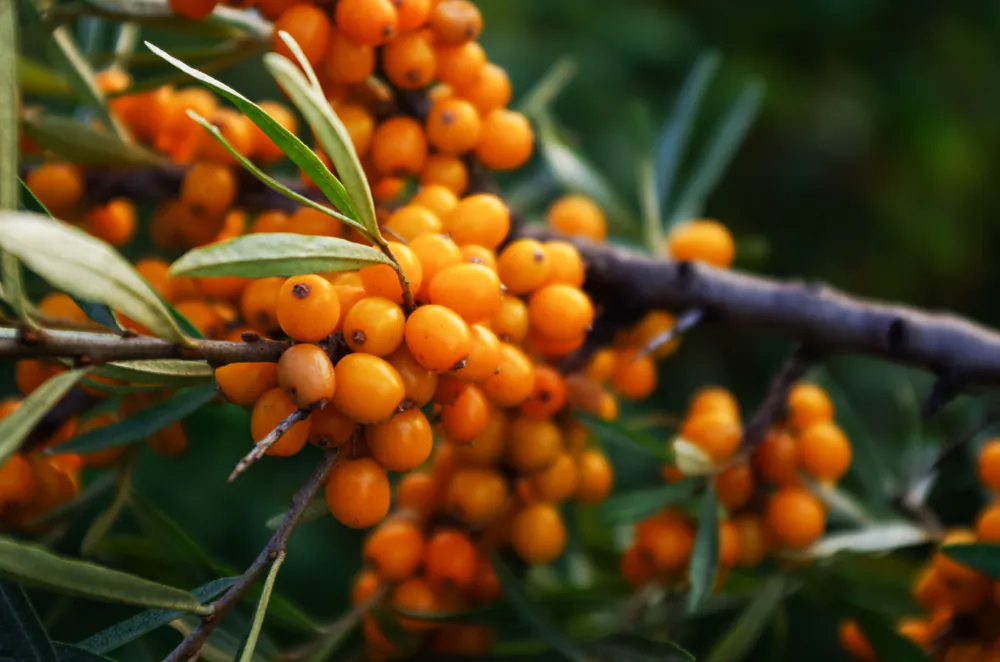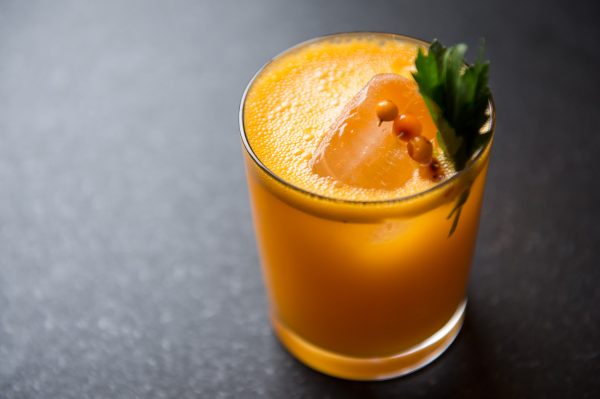Sea buckthorn is a deciduous shrub with beautiful bright orange berries that has been used for millennia as food and medicine. Native to China and parts of Europe, sea buckthorn thrives in harsh conditions and high altitudes—especially in the Himalayas, where records of its use in Tibetan medicine date back to the eighth century.
The Latin name for sea buckthorn is “Hippophae,” which comes from the Greek word “hippo,” for horse, and “phaos,” meaning “shine.” Sea buckthorn was fed to horses by the ancient Greeks to endow them with shiny, luxurious coats. It’s also known as sea berry and Siberian pineapple.
Genghis Khan reportedly used sea buckthorn to fortify the health of his soldiers and horses—keeping them battle-ready during his conquests in the 12th century.
In recent years, sea buckthorn has gained popularity in the West for its impressive nutritional profile and medicinal properties. Studies are continuing to discover the scope of its health benefits, which range from beautifying the skin to protecting against heart disease.
Bioactive Compounds and Healing Properties
Researchers have identified almost 200 bioactive compounds in sea buckthorn. It is a powerful antioxidant, likely because of its exceptionally high levels of vitamin C. Fresh berries average about 7,950 milligrams per kilogram of vitamin C, making them 12 times higher in vitamin C than oranges. Sea buckthorn is also a rich source of vitamin E and vitamins B1, B2, and B11.
Sea buckthorn is unique in that it contains all four omega fatty acids—omega-3, omega-6, omega-7, and omega-9. This rare combination may explain its benefits to the cardiovascular and immune systems and its ability to improve skin conditions and cognition.
This robust superfood also has demonstrated antibacterial, antiviral, antimicrobial, anti-obesity, and anticancer effects. Sea buckthorn has also been shown to have protective effects on the cardiovascular system, skin, brain, and liver.
Sea buckthorn is also a potent adaptogen, helping the body manage stress and return to a state of equilibrium.
The parts of the plant most commonly used are the leaves, flowers, seeds, and berries, and sea buckthorn is a common ingredient in cosmetics and hair products for its beneficial effects on the hair and skin. It can be taken as a supplement in pill or powder form, or you can buy sea buckthorn oil, as well as dried berries. Sea buckthorn products can be found in most health food shops or online. Do your research and read labels to make sure you are getting a high-quality product without additional ingredients that may be harmful.
You can also drink juiced sea buckthorn berries, which are allegedly quite tart, but when sweetened taste like a combination of citrus and mango or apricot.
Sea Buckthorn for Cardiovascular Health
Studies are demonstrating sea buckthorn’s beneficial effects on the cardiovascular system.
According to a review published in Food and Chemical Toxicology, sea buckthorn “has significant cardioprotective activity and exerts many positive healing effects on the cardiovascular system, including inhibiting blood platelet activation (especially platelet aggregation), lowering cholesterol concentration and blood pressure, and providing antioxidant activity.”
A small study on healthy men found that the oil from sea buckthorn berries inhibited platelet aggregation—a risk factor for cardiovascular disease.
In another study, researchers fed rabbits a high-cholesterol diet and gave them sea buckthorn seed oil for 30 days. They found that the rabbits had reduced plasma cholesterol, LDL, and HDL levels, a reduction in LDL/HDL ratio, and that the oil-fed rabbits had increased the ability of the aorta to relax, leading the researchers to conclude that sea buckthorn seed oil has “significant anti-atherogenic and cardioprotective activity.”
Sea Buckthorn for Skin Health
Sea buckthorn is often added to cosmetics and is hailed as a way to reduce wrinkles, increase collagen, and slow the signs of aging. Sea buckthorn benefits conditions like psoriasis, acne, and atopic dermatitis due in part to its high content of fatty acids and antioxidants, which lower inflammation.
A study published in the Asian Journal of Chemistry found that sea buckthorn extract applied to the cheeks of 21 healthy volunteers for eight weeks showed a “statistically significant” decrease in the skin’s melanin levels. The study also showed a significant reduction in skin erythema, which causes the skin to exhibit abnormal red patches that usually result from injury or irritation.
In a study using a rat model, researchers investigated the effectiveness of sea buckthorn seed oil on wound healing. The extract was applied topically to the wounds (burns) for seven days. The researchers concluded that the extract showed “significant wound healing activity and had no associated toxicity or side effects.”
Another small study investigated the anti-aging effects of sea buckthorn on human skin. Eleven healthy men with an average age of 24.5 years participated using either a sea buckthorn emulsion or a placebo for seven weeks. Researchers found that the men who used the sea buckthorn significantly improved most of the measured parameters which centered around skin elasticity. The researchers concluded that sea buckthorn could be a viable option for treating “age-related loss of skin elasticity.”
Sea Buckthorn in Chinese Medicine
In traditional Chinese medicine, sea buckthorn is known as sha ji—a warming herb that transforms phlegm and moves blood. It’s used for problems of the digestive system (which in Chinese medicine involves the spleen and stomach) and benefits the spleen, stomach, lungs, and heart.
Sha ji is used to harmonize digestion, soothe a cough, and break up masses caused by a blockage or stagnation of blood (which can eventually lead to tumors). These blockages are seen in many conditions involving pain. It is also used to stimulate the immune system and improve liver health.
Because the lungs are responsible for the skin in traditional Chinese medicine, sea buckthorn is used for many skin conditions, like acne, psoriasis, burns, bug bites, and to treat scars.
Ayurvedic and Tibetan Medicine
Sea buckthorn is an important herb in Ayurveda—the traditional medicine of India, as well as in Tibetan medicine, and has been used in those systems for thousands of years. As the Himalayas run through both regions, sea buckthorn is well known in that part of the world for its medicinal and nutritional prowess and is used to fortify health, support the immune system, improve digestion, and increase energy and stamina.
Contraindications
Although sea buckthorn has been used by many cultures for millennia, scientific studies on its beneficial health effects are ongoing, and more high-quality human studies are needed to further understand its underlying mechanisms and validate its beneficial effects.
Sea buckthorn is considered safe for most people, but as with any herb or supplement, consult with a health care practitioner before adding it to your daily routine if you are on medications or have health conditions. Because we all have unique physiology, our bodies react to things differently so when introducing something new, start slowly at low doses and track your reactions.
Because of sea buckthorn’s ability to thin the blood, anyone with a bleeding disorder, or those on blood thinning medications should avoid using sea buckthorn without first consulting with their doctor. If you are planning to have a surgical procedure, be sure to discontinue the use of sea buckthorn at least two weeks before your scheduled procedure due to the increased risk of bleeding.
Sea buckthorn has also shown potential to lower blood sugar and should be avoided by those using blood sugar-lowering medications.
Final Thoughts
Sea buckthorn may be a plant you have never heard of, but its extensive list of bioactive compounds shows promise in enhancing overall health and treating a variety of conditions. For anyone who wants to boost their health or is interested in prevention, sea buckthorn may be an option worth looking into.




